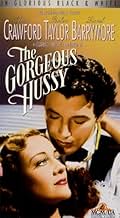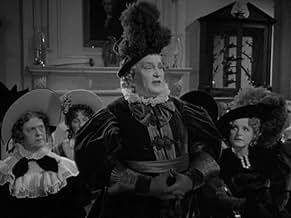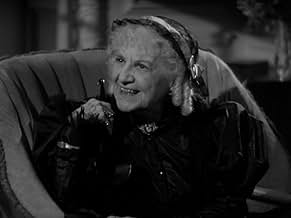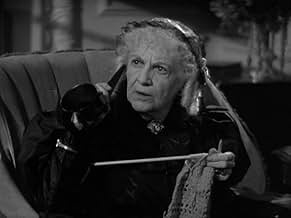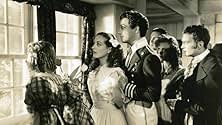CALIFICACIÓN DE IMDb
5.6/10
1.5 k
TU CALIFICACIÓN
La amistad del presidente Andrew Jackson con la hija de un posadero significa problemas para ambos.La amistad del presidente Andrew Jackson con la hija de un posadero significa problemas para ambos.La amistad del presidente Andrew Jackson con la hija de un posadero significa problemas para ambos.
- Dirección
- Guionistas
- Elenco
- Nominado a 2 premios Óscar
- 4 premios ganados y 2 nominaciones en total
Rubye De Remer
- Mrs. Bellamy
- (as Ruby de Remer)
- Dirección
- Guionistas
- Todo el elenco y el equipo
- Producción, taquilla y más en IMDbPro
Opiniones destacadas
MGM in trying to expand Joan Crawford's repertoire into period costume pieces spared no expense and gave her one all star cast in this drama about the Peggy O'Neal Eaton affair. The basic facts are true, Peggy O'Neal, daughter of a Washington, DC tavern-keeper and widow of a young Navy Lieutenant, marries the Senator from Tennessee who then is chosen Secretary of War in President Andrew Jackson's original cabinet. The Cabinet wives however refuse to receive Peggy socially as does the wife of the Vice President John C. Calhoun. Jackson blows his cabinet up, requests resignations from all involved and Eaton and Peg are sent in exile so to speak as he is made Minister to Spain.
The real story is far more complex than that. Jackson did regard Peggy as a slandered woman, much like his late wife Rachel was. Rachel Donelson Robards Jackson dies between the election and inauguration of Jackson. Beulah Bondi plays her in the movie and it's the best performance in the film. In real life this whole affair was being maneuvered behind the scenes by John Calhoun and Secretary of State Martin Van Buren taking anti and pro Peggy positions respectively. Van Buren's character is barely mentioned here. Played by Charles Trowbridge, he's given one or two lines in the film.
Robert Taylor strikes the right note as the young Naval Lieutenant Bow Timberlake. After Timberlake and Peggy are married, he is ordered to sea and dies there. The manner of his death has never been satisfactorily explained. It's also not explained here and that leaves the audiences up in the air.
Franchot Tone plays John Eaton and I think a lot of his performance is left on the cutting room floor. In real life there is some question as to whether Eaton and Peggy were involved while she was married to Timberlake.
But the most fantastic error in this plot is John Randolph's interest in Peggy. The real John Randolph was impotent, his testicles never descended, he never reached puberty. He never had any romantic attachments with anyone, he wasn't capable of it. In real life John Randolph because he never reached puberty had this girlishly high-pitched voice when he spoke on the floor of Congress. No one ever dared make fun of him though as he was a crack shot with a dueling pistol. Melvyn Douglas played a character with no basis in reality.
One of the other things I found a bit much was Douglas's constant prattle about state's rights. To him this a nice philosophy to be debated on the floor of Congress. Louis Calhern's character who is admittedly like a previous reviewer describes him as a Snidely Whiplash villain, is ready for secession. He goes to Randolph and says that he's organized a movement and he wants Randolph to lead it. The real Randolph would have been hot to trot for that. Melvyn Douglas reacts in horror however, he threatens to expose Calhern's villainy. Calhern has to shoot him. But if you think about it, the only thing Calhern did was take that state's right talk of Douglas to its logical conclusion and translate it into action.
The real John Randolph was never assassinated, he died of natural causes and had no major role in the Peggy O'Neal affair at all.
Maybe some day someone will make a better film of this incident.
The real story is far more complex than that. Jackson did regard Peggy as a slandered woman, much like his late wife Rachel was. Rachel Donelson Robards Jackson dies between the election and inauguration of Jackson. Beulah Bondi plays her in the movie and it's the best performance in the film. In real life this whole affair was being maneuvered behind the scenes by John Calhoun and Secretary of State Martin Van Buren taking anti and pro Peggy positions respectively. Van Buren's character is barely mentioned here. Played by Charles Trowbridge, he's given one or two lines in the film.
Robert Taylor strikes the right note as the young Naval Lieutenant Bow Timberlake. After Timberlake and Peggy are married, he is ordered to sea and dies there. The manner of his death has never been satisfactorily explained. It's also not explained here and that leaves the audiences up in the air.
Franchot Tone plays John Eaton and I think a lot of his performance is left on the cutting room floor. In real life there is some question as to whether Eaton and Peggy were involved while she was married to Timberlake.
But the most fantastic error in this plot is John Randolph's interest in Peggy. The real John Randolph was impotent, his testicles never descended, he never reached puberty. He never had any romantic attachments with anyone, he wasn't capable of it. In real life John Randolph because he never reached puberty had this girlishly high-pitched voice when he spoke on the floor of Congress. No one ever dared make fun of him though as he was a crack shot with a dueling pistol. Melvyn Douglas played a character with no basis in reality.
One of the other things I found a bit much was Douglas's constant prattle about state's rights. To him this a nice philosophy to be debated on the floor of Congress. Louis Calhern's character who is admittedly like a previous reviewer describes him as a Snidely Whiplash villain, is ready for secession. He goes to Randolph and says that he's organized a movement and he wants Randolph to lead it. The real Randolph would have been hot to trot for that. Melvyn Douglas reacts in horror however, he threatens to expose Calhern's villainy. Calhern has to shoot him. But if you think about it, the only thing Calhern did was take that state's right talk of Douglas to its logical conclusion and translate it into action.
The real John Randolph was never assassinated, he died of natural causes and had no major role in the Peggy O'Neal affair at all.
Maybe some day someone will make a better film of this incident.
Joan Crawford shines in this movie, despite what many of her detractors have said about her. I have read many articles about how she was not right in this role and that she was much better in contemporary films and not period dramas, such as this. But I will tell you that they are wrong. This is one very entertaining film and it holds your interest from beginning to end. Everything about this film is breathtaking, the sets, the costumes, the acting (not only from the leads, but also the minors), and even the make-up is very good. Just take a look at Charles Trowbridge and his likeness of Martin Van Buren--amazing!! This film has it all and this film puts another jewel in the Crawford crown of great acting!!
THE GORGEOUS HUSSY, based on a 1934 historical novel by Samuel Hopkins Adams, is another one of those genteel forays into the past from squeaky clean MGM. The only compelling ingredients in this overlong saga about the controversial hussy Peggy Eaton who wielded much influence over President Andrew Jackson are a few of the performances and the novelty of actual political debates occurring in the context of a love affair; Hollywood seldom mixed those two elements. The first half hour is bone dead, with familiar performers strutting around in period costumes and delivering the necessary exposition. Joan Crawford is not particularly persuasive as a young tavern keeper's daughter. She looks somewhat haggard and hard, but still beautiful. Things liven up with the appearance of Andrew Jackson (Lionel Barrymore) and his unpopular and maligned wife Rachel (Beulah Bondi). Barrymore may have been a ham who gave basically the same performance in film after film, but at least he puts some juice into the proceedings, making the most he can of the extremely diluted representation of Jackson supplied by the script. Bondi is touching in her depiction of the ill-fated Rachel, the love of Jackson's life. Until then we have had to endure endless moments with a dashing but wooden Melvyn Douglas and a competent but unexciting contribution from neophyte Robert Taylor. Jimmy Stewart and later Franchot Tone are on hand too but only in a few scenes and to little effect. And we have the always nasty and conniving Alison Skipworth as a disapproving society matron to hold our attention. And the marvelous Zeffie Tilbury as Skipworth's deaf mother who disagrees strongly with her snobbish daughter's malicious gossip. Between these bits there are occasionally interesting sketches of the political contentions of the time, mostly about how much power should be granted to the individual states, foreshadowing the Civil War. But we never get a sense of what an extraordinary woman the title character was. Nothing in Joan Crawford's performance or in the material given her indicates that this is anything other than an unusually attractive and well behaved lady with romantic yearnings but someone for whose honor and reputation a President would dissolve his cabinet and change the course of US history? No way. You cannot make a polite film about these characters in this historical period, but this is what MGM tried to do.
No! No! No! What is that most modern, at least to her time, of actresses Joan Crawford doing in hoop skirts and crinoline? Pretty much making a fool of herself, not that it's her fault MGM should have known better. There is not one look or gesture that she makes that has a feeling of any period but the 20th century.
Both stagnant and silly this completely miscast picture takes an interesting and scandalous piece of American history, The Petticoat Affair, and make it seem asinine and trivial when it practically tore Jackson's presidency apart and did lead to most of his cabinet's resignation.
Proof positive that not every film that came out of Hollywood's golden age and its premiere studio was a classic worth seeing filled with top flight talent or not. Even if you are a completist of any of the stars work this will be a struggle to get through.
Both stagnant and silly this completely miscast picture takes an interesting and scandalous piece of American history, The Petticoat Affair, and make it seem asinine and trivial when it practically tore Jackson's presidency apart and did lead to most of his cabinet's resignation.
Proof positive that not every film that came out of Hollywood's golden age and its premiere studio was a classic worth seeing filled with top flight talent or not. Even if you are a completist of any of the stars work this will be a struggle to get through.
If you think Joan Crawford is gorgeous, you're in much better shape than I was to watch The Gorgeous Hussy, since she plays the title character. Despite what the title leads you to believe, this is a movie about President Andrew Jackson. Lionel Barrymore plays the beloved president, and he puts his whole heart into the many speeches the script provides. Beulah Bondi plays Rachel Jackson, and in case you don't know your history, I won't tell you anymore, except that she was nominated for Best Supporting Actress in 1937.
Where does Joan Crawford come in, and why is the movie named after her? She's Jackson's niece, and she's desperately in love with a much older senator, Melvyn Douglas. When he sends her away for her own good, she throws herself into a relationship with the second man who flirts with her, Robert Taylor. A very young, gawky James Stewart is the first man, but she doesn't want anything to do with him. Robert is handsome and flirtatious, but he's also a sailor and therefore a little untrustworthy.
Joining the cast is Joan's then-husband Franchot Tone, Louis Calhern, and Gene Lockhart. The film alternates between a political drama and a love triangle between Joan, Melvyn, and whichever guy Joan is flirting with at the moment, hence the title. If you know your trivia about Gone With the Wind, you'll know that Melvyn Douglas was on the short-list for Ashley Wilkes, and after you watch this movie, it's easy to imagine him running circles around Leslie Howard's performance. He would have been a wonderful Ashley Wilkes, and if you agree, rent this movie for the next best thing.
Where does Joan Crawford come in, and why is the movie named after her? She's Jackson's niece, and she's desperately in love with a much older senator, Melvyn Douglas. When he sends her away for her own good, she throws herself into a relationship with the second man who flirts with her, Robert Taylor. A very young, gawky James Stewart is the first man, but she doesn't want anything to do with him. Robert is handsome and flirtatious, but he's also a sailor and therefore a little untrustworthy.
Joining the cast is Joan's then-husband Franchot Tone, Louis Calhern, and Gene Lockhart. The film alternates between a political drama and a love triangle between Joan, Melvyn, and whichever guy Joan is flirting with at the moment, hence the title. If you know your trivia about Gone With the Wind, you'll know that Melvyn Douglas was on the short-list for Ashley Wilkes, and after you watch this movie, it's easy to imagine him running circles around Leslie Howard's performance. He would have been a wonderful Ashley Wilkes, and if you agree, rent this movie for the next best thing.
¿Sabías que…?
- TriviaAccording to Melvyn Douglas, Joan Crawford got herself to cry by listening to recordings of "None but the Lonely Heart".
- ErroresThey are singing "Wait for the Wagon" on the hayride, but it wasn't written until 1850. "America" and "Listen to the Mockingbird" were not written at this time either.
- Citas
Daniel Webster: Well Miss Peggy, have you shaped any new political doctrines today?
Peggy Eaton: Ah Mr. Webster, I'm just an impressionable young woman.
- Créditos curiososPrologue: "This story of Peggy Eaton and her times is not presented as a precise account of either--rather, as fiction founded upon historical fact. Except for historically prominent personages, the characters are fictional. The city of Washington in 1823--heart of a country not yet a century old, not yet beyond an occasional growing pain."
- ConexionesFeatured in Great Performances: James Stewart: A Wonderful Life (1987)
- Bandas sonorasAmerica, My Country Tis of Thee
(uncredited)
Music by Lowell Mason
Music based on "God Save the King" written by Henry Carey
[Played in the opening scene as part of the score]
Selecciones populares
Inicia sesión para calificar y agrega a la lista de videos para obtener recomendaciones personalizadas
- How long is The Gorgeous Hussy?Con tecnología de Alexa
Detalles
Taquilla
- Presupuesto
- USD 1,119,000 (estimado)
- Tiempo de ejecución
- 1h 43min(103 min)
- Color
- Relación de aspecto
- 1.37 : 1
Contribuir a esta página
Sugiere una edición o agrega el contenido que falta


